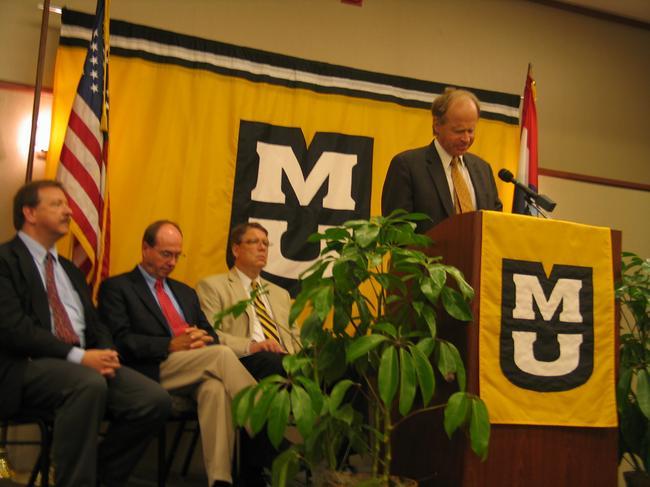MU and the city of Columbia announced a new partnership Wednesday with Gig.U.
The partnership is meant to create an ultra high-speed internet network on campus and throughout Columbia. In a press conference officially announcing the partnership, Chancellor Brady Deaton expressed his enthusiasm for the partnership.
“It’s a day of excitement,” he said. “A milestone.”
He said MU is one of approximately 30 other research institutions in the partnership, which includes Duke University, Arizona State University and the University of Virginia.
Gig.U, [according to its website](http://www.gig-u.org/blog/open-letter-from-gig-u-the-university-community-next-generation-innovation-project), aims to “accelerate the deployment of world-leading, next generation networks in the United States in a way that provides an opportunity to lead in the next generation of ultra high speed network services and applications.”
Blair Levin, former executive director of the National Broadband Plan, will lead the project.
“These networks facilitate economic growth,” Deaton said. “The partnership has enormous benefits, and not just for MU.”
Columbia Mayor Bob McDavid also spoke at the conference.
“The history of man is a history of exponential growth in technology,” McDavid said, highlighting another angle of the initiative’s importance.
McDavid reminisced about “green screen” computers with 256 kilobytes of memory and his state-of-the-art modem, which he described as being capable of going at 300 bits per second. He then praised our technological progress, saying we now have terabytes, not kilobytes of storage on hard drives.
“Internet is not a pipeline anymore,” he said. “It’s a river. A torrent.”
The mayor spoke about the importance of technological advancements in the community, noting that Forbes had voted Columbia the eighth best city for business and careers in 2010.
“Just seven more notches to go,” McDavid said.
He mentioned Columbia had been close to participating in the Google Fiber Initiative, and he was greatly disappointed when those plans fell through. Still, he said the Gig.U partnership is quite similar to the Google initiative, as Columbia’s IT Director Robert Simms pointed out.
“In essence, it’s what we wanted from Google,” Simms said.
The biggest difference between the Google Fiber Initiative and the Gig.U partnership is where the money comes from. Simms said Google’s initiative is for its own research purposes, and Gig.U is for the benefit of communities.
As such, the mayor said the partnership will rely heavily on investment funds from the private sector.
An open letter from Gig.U states that it hopes to deploy their ultra fast networks, not decades hence, but in the next several years.
“Within the next 90 days we will issue a Request for Information to current and potential service providers regarding new approaches to bring such networks to our communities,” the letter stated.
“Hop onboard the Gig.U train,” Mayor McDavid said in closing. “We’re leaving the station.”








